Eco-friendly living offers numerous benefits for human health, the environment, and personal finances. By protecting individuals and their families from harmful chemicals in skincare and processed foods, it promotes a healthier and better quality of life.
Additionally, eco-friendly practices contribute to waste reduction, environmental cleanliness, and energy conservation, resulting in long-term cost savings.
Ultimately, embracing eco-friendly living is crucial for preserving the environment, ensuring a sustainable future, and creating a positive impact on both our health and finances.
Key Takeaways
- Eco-friendly living promotes a healthier and better quality of life, reducing the prevalence of life-threatening diseases like cancer.
- Eco-friendly practices contribute to waste reduction and environmental cleanliness, helping to create a cleaner and healthier environment.
- Energy conservation is a major benefit of eco-friendly living, as it helps reduce energy consumption and save costs.
- Choosing eco-friendly alternatives often comes with long-term cost savings, making green living a win-win situation for both the planet and personal finances.
Protection Against Harmful Chemicals
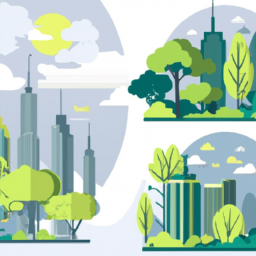
Using green products ensures that individuals and their families aren’t exposed to harmful chemicals, promoting a healthier and better quality of life. This is particularly important when it comes to skincare options.
Many traditional skincare products contain harmful chemicals such as parabens, phthalates, and synthetic fragrances. These chemicals have been linked to a range of health issues, including skin irritation, allergies, hormonal disruptions, and even cancer.
Waste Reduction and Environmental Cleanliness

Recycling and composting contribute to a cleaner and healthier environment by reducing the amount of waste produced. Compost creation is an effective method to manage organic waste. By decomposing organic materials such as food scraps and yard waste, compost can be created and used as a natural fertilizer, reducing the need for chemical-based fertilizers. This helps in maintaining soil health and reducing water pollution caused by chemical runoff. Furthermore, composting reduces the emission of greenhouse gases that contribute to climate change.
In addition to compost creation, recycling plays a crucial role in tackling plastic pollution. Plastic pollution is a significant environmental issue, with millions of tons of plastic waste ending up in our oceans and landfills each year. Recycling plastic helps to conserve natural resources, reduce energy consumption, and minimize the release of harmful chemicals during the production of new plastic. It also prevents plastic waste from polluting our ecosystems and endangering wildlife.
Energy Conservation
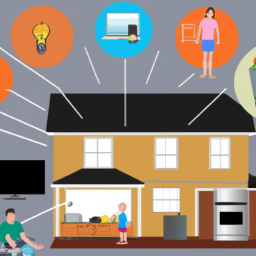
Conserving energy is essential for reducing carbon emissions and addressing the challenge of consuming more energy than the Earth can replenish.
One way to achieve energy conservation is by using energy-efficient appliances. These appliances are designed to minimize the amount of energy they consume while still providing the necessary functionality. By replacing old, inefficient appliances with energy-efficient ones, individuals can significantly reduce their energy consumption and, consequently, their carbon footprint.
Another important aspect of energy conservation is the use of renewable energy sources. Renewable energy sources, such as solar and wind power, provide a sustainable and environmentally friendly alternative to fossil fuels. By harnessing the power of these sources, individuals can reduce their reliance on non-renewable energy and contribute to the overall conservation of energy.
Cost Savings
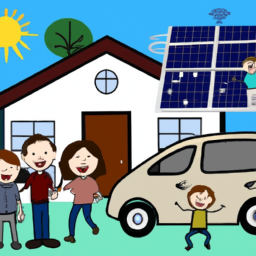
By adopting eco-friendly practices, individuals can significantly reduce their monthly expenses and achieve long-term cost savings. Here are some economic benefits and financial advantages of eco-friendly living:
Lower bills: Energy-conscious practices help reduce electricity and gas consumption, resulting in lower utility bills.
Reduced need for buying new products: Recycling and reusing items minimize the need for purchasing new ones, saving money in the long run.
Long-term cost savings: Choosing eco-friendly alternatives often comes with long-term financial benefits, such as lower maintenance and replacement costs.
Affordable options: Many eco-friendly products, such as energy-efficient appliances and LED lighting, have become more affordable, making it easier to save money while being environmentally conscious.
Overall, embracing eco-friendly living not only contributes to a healthier planet but also brings financial advantages, making it a win-win situation for individuals and their wallets.
Environmental Preservation
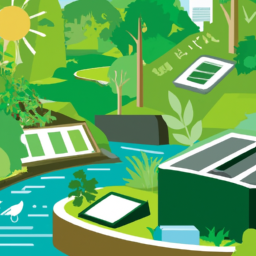
Preserving the natural world and its delicate balance is essential for the future of all living beings. One of the key benefits of eco-friendly living is the preservation of biodiversity and the promotion of ecological balance.
Activities such as deforestation and the release of pollutants disrupt the balance in the ecosystem, leading to the loss of various species and the degradation of habitats. By adopting eco-friendly practices, individuals can help prevent the extinction of life on Earth and restore the planet’s initial glory.
Preserving biodiversity is crucial as it ensures the stability of ecosystems and the availability of essential resources for all living beings. Furthermore, promoting ecological balance helps maintain the delicate interactions between different organisms, contributing to the overall health and sustainability of the environment.
Improved Human Health and Quality of Life

Using eco-friendly practices can lead to a healthier lifestyle and improved well-being for individuals and their families. It is important to consider the impact of our daily choices on our health and the environment. Here are some key benefits of incorporating eco-friendly practices into our lives:
Reduced pollution: Eco-friendly living helps reduce pollution by minimizing the use of harmful chemicals and toxins. This not only benefits the environment but also protects our health from the negative effects of pollution.
Eco-friendly skincare products: By opting for eco-friendly skincare products, individuals can avoid exposure to harmful chemicals that are often found in conventional skincare products. These chemicals can lead to skin irritations, allergies, and long-term health issues.
Better air quality: Eco-friendly practices such as reducing energy consumption and using renewable energy sources help improve air quality. This can have a positive impact on respiratory health and reduce the risk of respiratory diseases.
Sustainable living: Eco-friendly practices promote sustainable living by conserving resources, reducing waste, and making conscious choices. This can lead to a better quality of life, as it ensures the availability of resources for future generations.
Sustainable Future for Future Generations

Sustainable practices ensure a better future for generations to come. By adopting eco-friendly living and sustainability practices, individuals can contribute to the long-term benefits of a sustainable future.
This includes protecting the environment, preserving natural resources, and minimizing the impact of human activities on the planet. Sustainable practices involve reducing waste, conserving energy, and making environmentally conscious choices. These actions not only benefit the environment but also have positive effects on human health and finances.
For example, by reducing waste and energy consumption, individuals can save money on bills and expenses. Additionally, eco-friendly living promotes a healthier lifestyle, reducing the risk of diseases and improving overall quality of life.
Positive Impact on Finances
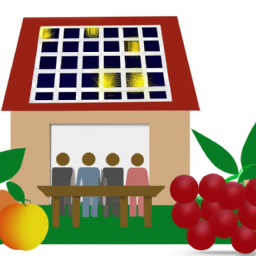
Transitioning from the previous subtopic of ‘Sustainable Future for Future Generations,’ it is important to explore the positive impact of eco-friendly living on finances. By making environmentally conscious choices, individuals can not only contribute towards a sustainable future but also experience significant cost savings. Here are some key points to consider:
Eco-friendly investments: Investing in green technologies and sustainable businesses can provide attractive financial returns while supporting environmental preservation.
Green business opportunities: The demand for eco-friendly products and services is on the rise, creating numerous entrepreneurial opportunities and job prospects.
Reduced expenses: Adopting eco-friendly practices such as energy conservation and waste reduction can lead to lower utility bills and reduced expenses in the long run.
Long-term cost savings: Choosing eco-friendly alternatives often comes with long-term financial benefits, as they are designed for durability and energy efficiency.
Frequently Asked Questions
How Can Eco-Friendly Living Contribute to Reducing the Prevalence of Cancer and Other Life-Threatening Diseases?
Eco-friendly living contributes to reducing the prevalence of cancer and other life-threatening diseases by reducing pollution and improving air quality. Harmful chemicals and pollutants released into the environment can increase the risk of developing these diseases.
What Are Some Specific Ways That Eco-Friendly Practices Can Help Reduce Waste and Promote Environmental Cleanliness?
Reducing waste and promoting cleanliness are key aspects of eco-friendly practices. By making compost and recycling used products, individuals can significantly reduce the amount of waste produced.
Proper waste disposal helps prevent water pollution and maintains a clean environment for various human activities.
Eco-friendly living also saves money that would have been spent on replacing old products.
Ultimately, these practices contribute to a cleaner and healthier environment, benefiting both present and future generations.
How Does Eco-Friendly Living Help in Conserving Energy and Reducing the Consumption of Resources Like Electricity and Gas?
Eco-friendly living helps conserve energy and reduce the consumption of resources like electricity and gas through various conservation strategies. By opting for energy-efficient appliances, individuals can significantly reduce their energy consumption. This not only leads to cost savings but also helps in preserving the environment by reducing greenhouse gas emissions.
Additionally, practicing energy-conscious habits such as turning off lights and electronics when not in use further contributes to conservation efforts. Overall, eco-friendly living plays a crucial role in reducing resource consumption and promoting sustainability.
Can You Provide Examples of How Eco-Friendly Living Can Lead to Long-Term Cost Savings?
Eco-friendly living can lead to long-term cost savings in various ways.
By recycling and reusing products, individuals can reduce the need for buying new ones, saving money in the process.
Additionally, energy-conscious practices, such as using energy-efficient appliances and insulating homes, can significantly reduce electricity and gas consumption, resulting in lower bills.
Choosing eco-friendly alternatives also often comes with long-term cost savings, making it a smart financial choice.
Furthermore, the health benefits of eco-friendly living, such as reducing exposure to harmful chemicals, can lead to potential savings on healthcare costs.
In What Ways Does Eco-Friendly Living Contribute to the Preservation of the Environment and the Prevention of Species Extinction?
Eco-friendly living contributes to the preservation of the environment and the prevention of species extinction in several ways.
By adopting sustainable practices, individuals reduce their carbon footprint and minimize the release of greenhouse gases, thereby mitigating climate change.
Additionally, eco-friendly living promotes biodiversity by preserving natural habitats and ecosystems. This, in turn, supports a variety of plant and animal species, ensuring their survival and preventing their extinction.
Overall, eco-friendly living plays a crucial role in maintaining the delicate balance of our planet’s ecosystems and protecting its diverse array of life forms.
Conclusion
In conclusion, eco-friendly living offers numerous benefits for human health, the environment, and personal finances.
By avoiding harmful chemicals in skincare products and processed foods, individuals can protect themselves and their families from potential health risks.
Additionally, waste reduction and environmental cleanliness contribute to a cleaner and healthier environment, while energy conservation helps conserve valuable resources.
Moreover, eco-friendly practices can lead to long-term cost savings by reducing the need for new products and lowering utility bills.
Ultimately, embracing eco-friendly living is crucial for preserving the environment and ensuring a sustainable future for generations to come.